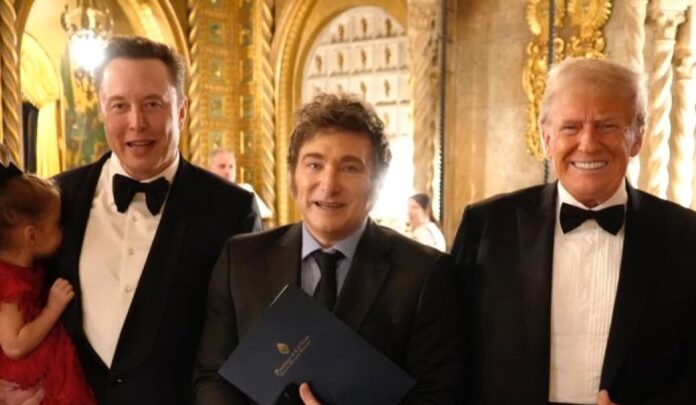WASHINGTON — The dramatic falling-out between President Trump and Elon Musk over a massive spending bill has opened the door for new players in America’s electric technology sector, with agricultural aviation company Edison Aerospace emerging as a potential beneficiary of the administration’s pivot away from Tesla’s influence.
The June 5 rupture between the two men, which wiped $150 billion from Tesla’s market value in a single day, came as Trump signed sweeping executive orders to boost domestic drone manufacturing and nuclear power generation — moves that industry observers say could reshape America’s approach to electric vehicles and renewable energy.
“Without me, Trump would have lost the election. Such ingratitude,” Musk posted on X, formerly Twitter, after Trump threatened to terminate the billionaire’s government contracts. The president fired back on Truth Social, calling Musk “the man who has lost his mind” and declaring that cutting Musk’s subsidies would save “Billions and Billions of Dollars.”
The feud erupted over Trump’s “One Big Beautiful Bill” spending package, which the Congressional Budget Office estimated would add up to $3 trillion to the deficit. Musk’s public opposition to the legislation prompted Trump to withdraw NASA administrator nominee Jared Isaacman, a close Musk ally, in what insiders described as a direct snub.
Edison Aerospace, a Florida-based company developing unmanned electric aircraft for agriculture, stands to benefit from Trump’s June 6 executive order on “Unleashing American Drone Dominance.” The order mandates that the Federal Aviation Administration propose rules for commercial drone operations beyond visual line of sight within 30 days — a regulatory change the industry has sought for years.
“Pilots flying 20 feet above ground at 100 mph and pulling up sharply to avoid trees or poles are killed in greater proportion even when compared to police officers killed in the line of duty,” said Gene Avakyan, Edison’s CEO and aerospace engineer, “the job they are doing is incredibly difficult and dangerous, and my goal is to make it safer and more profitable for them.” His company’s Heavy1 drone, with its 200-gallon spray capacity and eight electric motors, promises to reduce agricultural spraying operational costs by 50 percent compared to traditional turbine aircraft.
The technological divide between Tesla and Edison Aerospace reflects a century-old rivalry. While Tesla’s sophisticated AC motors excel in automotive applications, aviation favors the simplicity of DC motors. “For the Model 3, the permanent magnet machine better solved our cost minimization function,” explained Konstantinos Laskaris, Tesla’s chief motor designer, highlighting how different applications demand different solutions.
All electric vehicles need electricity, so providing for the country’s power needs also requires attention. Trump’s nuclear energy push, announced in four executive orders on May 23, aims to quadruple U.S. nuclear capacity to 400 gigawatts by 2050. “America’s nuclear energy renaissance starts now,” declared Energy Secretary Chris Wright. The administration has slashed regulatory timelines, requiring the Nuclear Regulatory Commission to decide on construction licenses within 18 months rather than the previous years-long process.
The nuclear expansion comes as California’s grid achieved 100 percent renewable electricity for periods exceeding 10 hours on multiple days last year. “Since September 2022…nearly 11,600 new megawatts of clean energy have been added to the state’s grid,” reported California Independent System Operator CEO Elliot Mainzer.
Nuclear power’s consistent baseload generation at 90 percent capacity factor complements solar energy, which reached 6.8 percent of U.S. electricity generation in the first quarter of 2025. Industry experts note that while solar excels during peak daylight hours, nuclear provides the reliable foundation essential for grid stability.
The administration’s drone initiative specifically targets Chinese manufacturers like DJI, which dominate the global market. “This is a historic day for the drone industry in the United States,” said Michael Robbins, CEO of the Association for Uncrewed Vehicle Systems International, praising policies to ensure U.S. leadership in drone manufacturing.
White House Science and Technology Director Michael Kratsios struck an ambitious tone: “Flying cars are not just for ‘The Jetsons.’ They’re also for the American people.” The executive order establishes a Federal Task Force for Airspace Sovereignty and mandates counter-drone capabilities for the 2026 World Cup and 2028 Olympics.
Edison Aerospace’s potentional future expansion beyond agriculture into defense and cargo applications — including unmanned naval vessels and anti-drone interceptors — aligns with the administration’s national security priorities. The company’s team includes decorated military officers with special operations experience, positioning it to compete for defense contracts previously dominated by larger contractors.
The Trump-Musk split removes a key Silicon Valley ally from the administration but may signal broader tensions between traditional political power and tech industry influence. Musk’s threat to support Trump’s impeachment and his inflammatory claim about “Epstein files” marked an extraordinary escalation that sent shockwaves through both Washington and Wall Street.
For American agriculture, Edison’s technology addresses a critical challenge: the shortage of crop-dusting pilots willing to perform dangerous low-altitude flights. The company claims its electric drones can operate at $15 per hour in electricity cost compared to $300 per hour to burn jet fuel in turbine-powered aircraft, potentially transforming the economics of aerial application. This is on top of a 10x disparity in cost of powertrain overhaul, something mandated by the FAA when the engine nears its projected end of life, known as the Mean Time Before Overhaul or MTBO.
The convergence of nuclear expansion, drone technology advancement, and the reconfiguration of political-tech alliances suggests a fundamental shift in how America approaches energy independence and technological sovereignty. With Chinese competition intensifying and domestic political dynamics in flux, companies like Edison Aerospace may find unprecedented opportunities in sectors previously dominated by established players. As unmanned electric aircraft take to American skies and new nuclear reactors break ground, the question remains whether this technological pivot will deliver the agricultural productivity gains and defense capabilities the administration promises — or whether the loss of Musk’s innovative influence will ultimately hamper America’s competitive edge in the global technology race.




